Croatia
Seitenübersicht
[Ausblenden]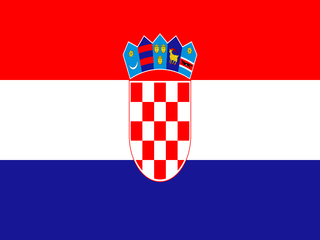 source:wikipedia.org Country | 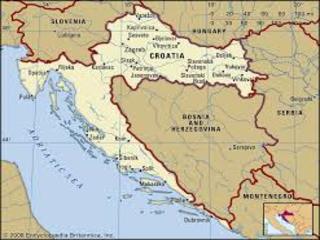 source:Britannica.org Croatia |
Population/density | 4076246/73/km2
|
Size | 56,594 km2
|
GDP per capita | $15,646
|
Type of government | Parliamentary democracy (Sabor)
|
Member of EU | 1.7.2013
|
Healthcare budget (2020) | 328 mil. Euros
|
Free primary care | yes
|
HDI (2018) | 29,7
|
GINI (2018) | 0,837 |
1 Introduction
In December 2019, the novel virus COVID-19 appeared at the Wuhan wet market. The virus has been proven to cause severe cough and pneumonia and also has the potential to cause mass death. One of the characteristics that has sparked great fear among the medical community is the high level of transmission between people. At the end of the same month, Chinese authorities had warned the World Health Organisation about the domestic outbreak of viral pneumonia, caused by the virus. [1] . Even though infection spread rapidly, and the WHO declared the epidemic a Public Health Emergency of International Concern, almost 8000 cases in 19 countries weren't enough for a global response. [2] . The situation remained the same until the end of February when Italy started reporting a high number of COVID-19 cases[3] . Since it was clear that the virus began to spread exponentially, on March 9th, Italian prime minister Giuseppe Conte put the entire country in quarantine[4] , isolating 60 million people from the rest of the continent, and therefore enacting the most extensive quarantine in modern European history. Realising the danger of the further spread of the virus, most of the neighbouring countries passed a list of measures such as border closures and a 14-day quarantine for those who arrived in a country from infected areas[5] . Among them, Croatia was leading in the severity of implemented measures.[6] .
In this wiki, the Croatian COVID19 crisis management will be presented through the classification used by Boin et al. (Boin et al., 2016: 15) [7]
In this wiki, the Croatian COVID19 crisis management will be presented through the classification used by Boin et al. (Boin et al., 2016: 15) [7]
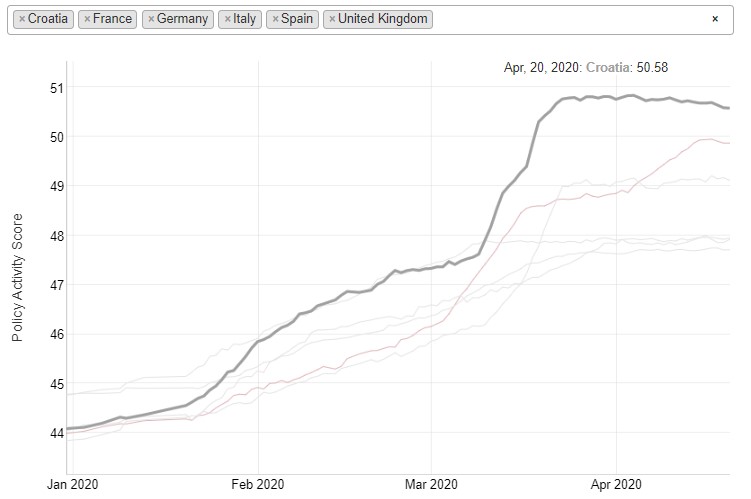
source: www.coronanet-project.org/visuals.html
2 Preparedness
In liberal democracies, preparedness is one of the essential steps in crisis management (Boin et al., 2016: 14)[8] . That is especially emphasised because the crisis is uncertain and not predictable (Boin et al. 2016: 7)[9] . At the beginning of 2020, Croatia took over the Presidency of the European Union. That role determined the response of the Croatian government as infections started to spread all over Europe. With the recent war in the nineties, Croatia already had previous experience with crisis management and paralysation of economic activities. However, that does include not only the governmental level but also the citizens, who were used to emergency state and immediate implementation of restrictive measures. That prompted the government to answer in the first phase of the pandemic, which resulted in the prevention of the exponential spread of the virus. From the 23rd of January to the 20th of April, the Croatian government had enacted numerous measures in internal and foreign affairs. The following chronology will show prepared measures till 18 March when the Croatian government decided to close borders and entrance in the country (except for extraordinary cases). The full chronology can be found on koronavirus.hr[10]
Chronology:
Chronology:
- January 23 - At the initiative of the Ministry of Health, the Croatian Institute of Public Health published a multilingual leaflet and notification on coronavirus for travellers to China (in Croatian, English and Chinese)
- January 24 – The measures for prevention and protection against coronavirus were taken at international airports and seaports in Croatia in cooperation with the border police, emergency medical services, border sanitary inspectors, county epidemiologists and airlines
- January 28 - Due to the occurrence of isolated cases of coronavirus in some EU Member States, the Croatian Presidency of the Council of the European Union has decided to activate the EU's Integrated Political Crisis Response (IPCR) arrangements in the form of information exchange. This mechanism is a coordination mechanism for crisis situations and brings together all information coming from different actors (EU Member States, EU institutions, World Health Organization, etc.), and is a very useful tool for monitoring further developments and assessing further activities
- February 13 - At the initiative of Croatia, which holds the presidency of the Council of the European Union, an extraordinary meeting of health ministers of the 27 member states was held, at which measures for better coordination in response to the new coronavirus and measures to combat the risk of spread were agreed
- February 20 - The Croatian government established the Civil Protection Headquarters of the Republic of Croatia to coordinate all services in the event of a coronavirus outbreak in Croatia. Deputy Prime Minister and Minister of the Interior Davor Božinović has been appointed Chief of Staff
- February 26 - Daily sessions of the Civil Protection Headquarters of the Republic of Croatia were introduced at 9 am and 4 pm, after which press releases are issued and published on the website of the Directorate of Civil Protection
2.1 Preparedness of the Health System
The Croatian health system built its foundation at the beginning of the 20th century. Andrija Štampar, a Croatian doctor and one of the founders of the World Health Organisation, initiated the establishment and development of a broad network of health institutes and health centres. Aiming at raising public and professional awareness about necessary hygiene procedures, Štampar successfully created a decentralised and efficient system that effectively battled several epidemics in former Yugoslavia, on the territory of today's Croatia[11] .
Since Croatia has a decentralised and highly independent health system, the central government decided to delegate full authority in taking preparedness measures for the incoming epidemic. Central bodies for the responding to epidemic constitute the Croatian Institute for Public Health and the Hospital for the Infectious Disease "Fran Mihaljević" supported by the Health Ministry as the representative of the central government[12] .
Even before the Italian outbreak, Croatia started the preparation for the incoming pandemic. On January 25, Croatian newspapers started reporting about intensive preparation for potential expansion of the virus in Croatia[13] .
The Hospital "Fran Mihaljević" became the centre, and in that time, the only hospital specialised for treating COVID-19 patients, while at the same time the Croatian Institute for Public Health closely monitored the development of the situation around the world.[14] .
When asked by critics if Croatia has adequate means to fight the epidemic and its consequences, the Croatian Health minister, Vili Beroš pointed at Croatia’s 800 stationary and 300 mobile ventilators which should be efficient for taking care of all serious cases. In the meantime, the Croatian government commenced the purchase of additional basic medical equipment, including millions of masks, gloves and other materials necessary for treating COVID-19 patients[15] . Also, because the situation in Italy rapidly deteriorated, the Croatian government decided to repurpose the biggest sports hall in Croatia as a hospital for mild cases, and trying, in that case, to contain the local transmission rate[16] .
Alongside the health measures, the Croatian government announced several acts forbidding the rise of the prices of basic goods, thus preventing potential exploitation of the epidemic situation for financial gain [17] .
Since Croatia has a decentralised and highly independent health system, the central government decided to delegate full authority in taking preparedness measures for the incoming epidemic. Central bodies for the responding to epidemic constitute the Croatian Institute for Public Health and the Hospital for the Infectious Disease "Fran Mihaljević" supported by the Health Ministry as the representative of the central government[12] .
Even before the Italian outbreak, Croatia started the preparation for the incoming pandemic. On January 25, Croatian newspapers started reporting about intensive preparation for potential expansion of the virus in Croatia[13] .
The Hospital "Fran Mihaljević" became the centre, and in that time, the only hospital specialised for treating COVID-19 patients, while at the same time the Croatian Institute for Public Health closely monitored the development of the situation around the world.[14] .
When asked by critics if Croatia has adequate means to fight the epidemic and its consequences, the Croatian Health minister, Vili Beroš pointed at Croatia’s 800 stationary and 300 mobile ventilators which should be efficient for taking care of all serious cases. In the meantime, the Croatian government commenced the purchase of additional basic medical equipment, including millions of masks, gloves and other materials necessary for treating COVID-19 patients[15] . Also, because the situation in Italy rapidly deteriorated, the Croatian government decided to repurpose the biggest sports hall in Croatia as a hospital for mild cases, and trying, in that case, to contain the local transmission rate[16] .
Alongside the health measures, the Croatian government announced several acts forbidding the rise of the prices of basic goods, thus preventing potential exploitation of the epidemic situation for financial gain [17] .

Empty store shelves after increasing number of infected people source: dnevnik.hr
2.2 Preparedness of the hospitals - COVID rooms and tents
One of the unique characteristics of the novel coronavirus was the high level of virus transmission. Therefore all the regional hospitals, including the central COVID19 hospital, Fran Mihaljević, needed to develop special protocols for treating COVID19 patients. Each hospital was equipped with a special room for treating serious cases, while mild cases and suspicious patients were treated in mobile tents in front of the hospitals. That type of organisation was supposed to prevent a potential outbreak in the hospitals and therefore protect the most sensitive patients[18] . A similar system of the mobile ambulances was also implemented in Portugal.
Since the epidemic situation in Italy became worse day by day and because of the relative proximity of Italy, the Croatian Health Ministery decided to also increase the number of available beds in case of a widespread outbreak of the virus. For that purpose, the largest sports hall in Zagreb, "Arena Zagreb" was repurposed and equipped as a COVID19 hospital for mild cases[19] . The same concept of repurposing civil buildings for the medical situation was also implemented in Bulgaria.
Since the epidemic situation in Italy became worse day by day and because of the relative proximity of Italy, the Croatian Health Ministery decided to also increase the number of available beds in case of a widespread outbreak of the virus. For that purpose, the largest sports hall in Zagreb, "Arena Zagreb" was repurposed and equipped as a COVID19 hospital for mild cases[19] . The same concept of repurposing civil buildings for the medical situation was also implemented in Bulgaria.
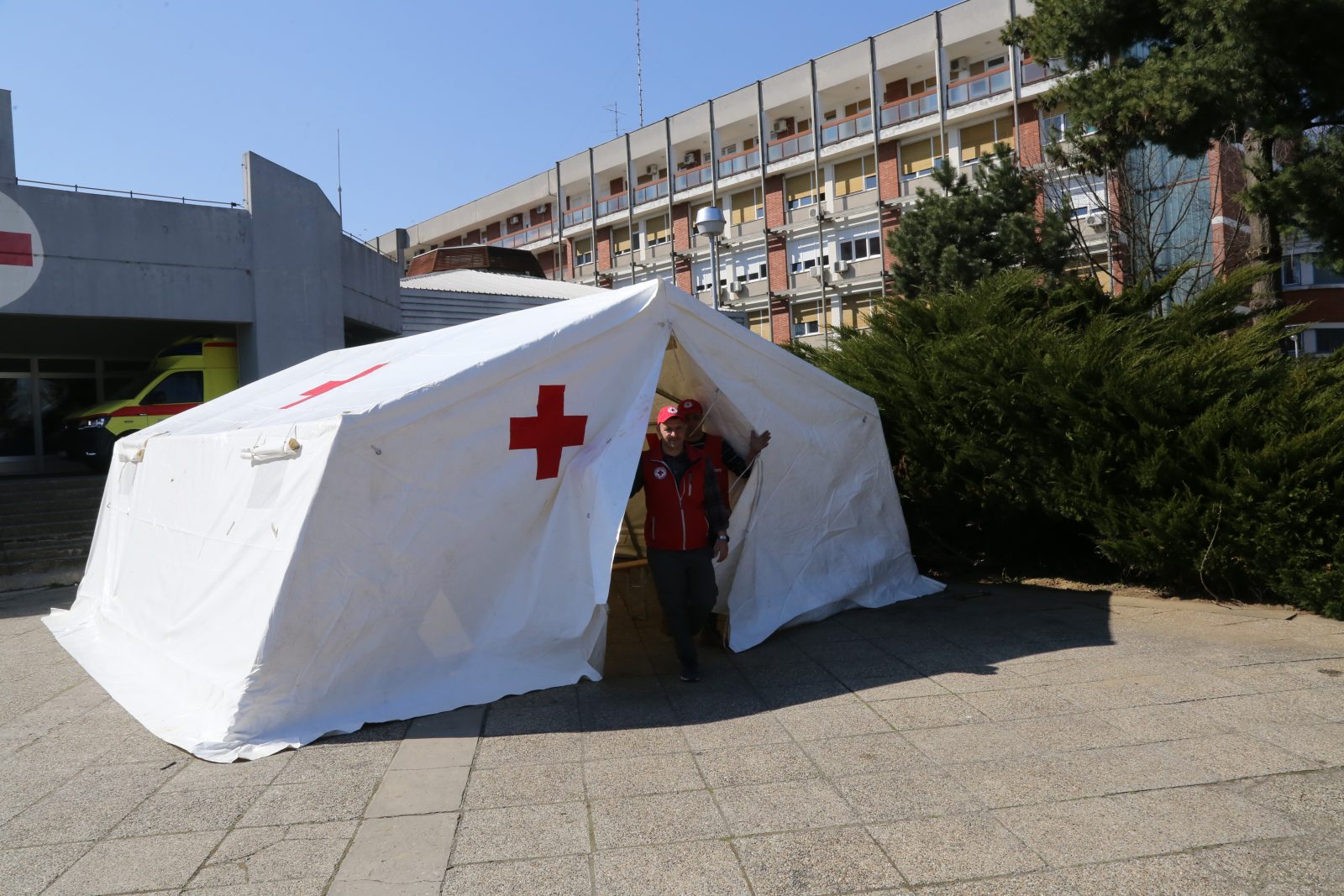
Source: Mnovine.hr
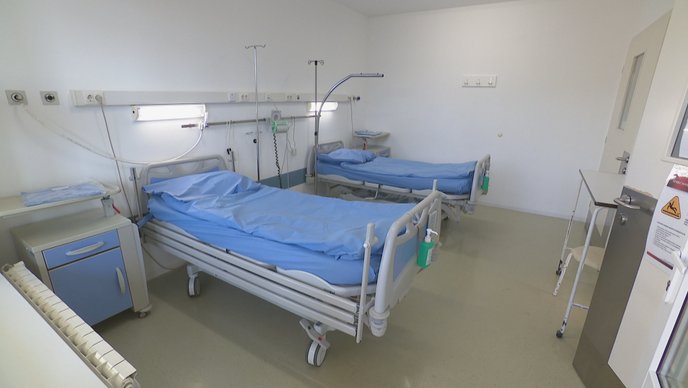
Source: vijesti.hrt.hr
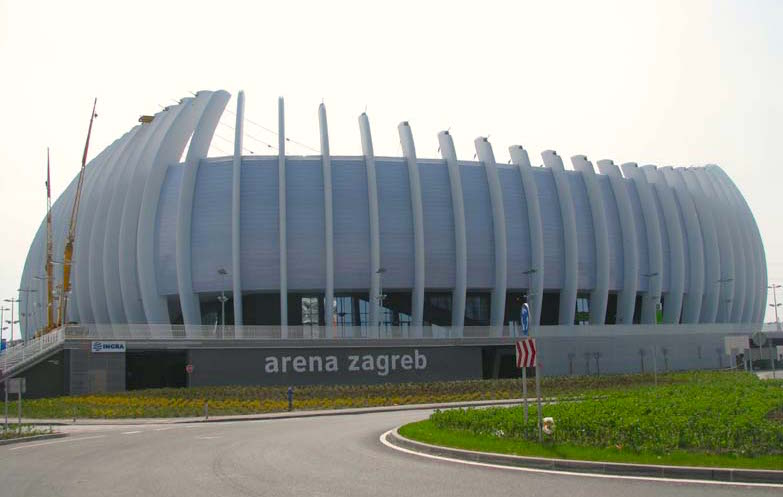
Source: de.wikipedia.org
2.3 GHS Index
The Global Health Security (GHS) Index is a comprehensive assessment of health security and related capabilities across the 195 countries. The GHS Index project was founded by the Nuclear Threat Initiative (NTI) and the Johns Hopkins Center for Health Security (JHU) and was developed in cooperation with The Economist Intelligence Unit (EIU). The idea behind the project was to develop a measuring tool that could show how ready each country is for the future, inevitable epidemic, and pandemics in general[20] .
On the index, Croatia is ranked 38 out of 195 countries, surpassing some more developed countries, slightly behind Chile , Brazil, New Zealand. Even though Croatia has a limited health budget and health facilities, high scores on the capacity to prevent and detect health threats helped Croatia to successfully battle the Corona epidemic in the first phase.
On the index, Croatia is ranked 38 out of 195 countries, surpassing some more developed countries, slightly behind Chile , Brazil, New Zealand. Even though Croatia has a limited health budget and health facilities, high scores on the capacity to prevent and detect health threats helped Croatia to successfully battle the Corona epidemic in the first phase.
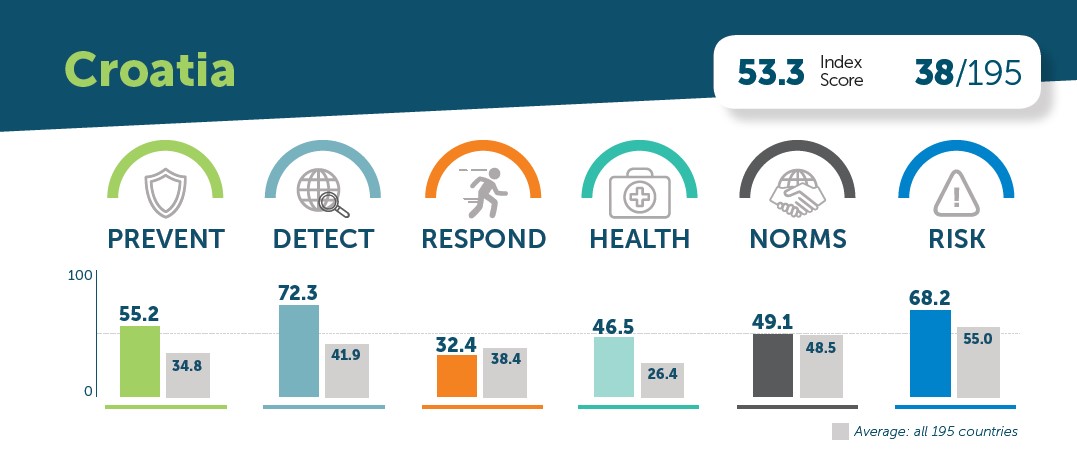
source:ghsindex.org
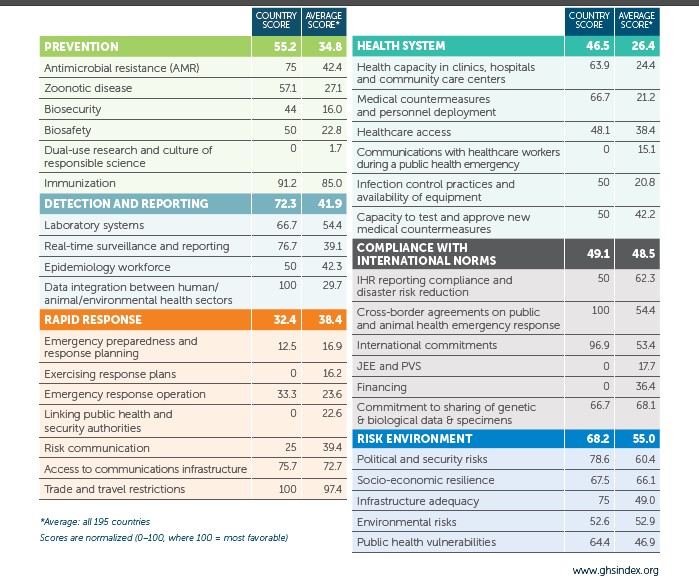
source: ghsindex.org
3 Sense-making
Boin et al. define sense-making as "collecting and processing information that will help crisis managers to detect an emerging crisis and understand the significance of what is going on during a crisis" (Boin et al., 2016: 15).
As mentioned before, Croatia took over the presidency of the European Union. That emphasised the importance of collecting and providing information in a timely manner. At the end of January, the Croatian health authorities started monitoring closely all travels from China, imposing a 14-day quarantine for every person that came from that area. Fortunately, due to the usually limited air traffic between Croatia and the Far East, Croatia didn't detect a transfer of the virus from China.
The defining moment that shaped the future response of the country happened a month later when Croatia officially confirmed its first case. On February 25, it was confirmed that a young man who visited a football game in Milano was infected with the virus[21] . Croatia was able to successfully track its patient zero, same as South Korea, Norway,Israel, New Zealand, Taiwan and Spain. Because of Italy prevailing as a new centre of the epidemic, the established transit of goods and people back and forth, and its close geographical proximity to Croatia, it was clear that the first case will not remain an isolated incident. Several days later, the virus appeared in the northern part of the Adriatic coast which is historically and economically more connected with Italy. The outbreak in Slovenia, which is the buffer zone between Croatia and Italy directly affected the situation in the rest of the country, spreading infections in the northern and eastern regions as well.[22] .
As mentioned before, Croatia took over the presidency of the European Union. That emphasised the importance of collecting and providing information in a timely manner. At the end of January, the Croatian health authorities started monitoring closely all travels from China, imposing a 14-day quarantine for every person that came from that area. Fortunately, due to the usually limited air traffic between Croatia and the Far East, Croatia didn't detect a transfer of the virus from China.
The defining moment that shaped the future response of the country happened a month later when Croatia officially confirmed its first case. On February 25, it was confirmed that a young man who visited a football game in Milano was infected with the virus[21] . Croatia was able to successfully track its patient zero, same as South Korea, Norway,Israel, New Zealand, Taiwan and Spain. Because of Italy prevailing as a new centre of the epidemic, the established transit of goods and people back and forth, and its close geographical proximity to Croatia, it was clear that the first case will not remain an isolated incident. Several days later, the virus appeared in the northern part of the Adriatic coast which is historically and economically more connected with Italy. The outbreak in Slovenia, which is the buffer zone between Croatia and Italy directly affected the situation in the rest of the country, spreading infections in the northern and eastern regions as well.[22] .
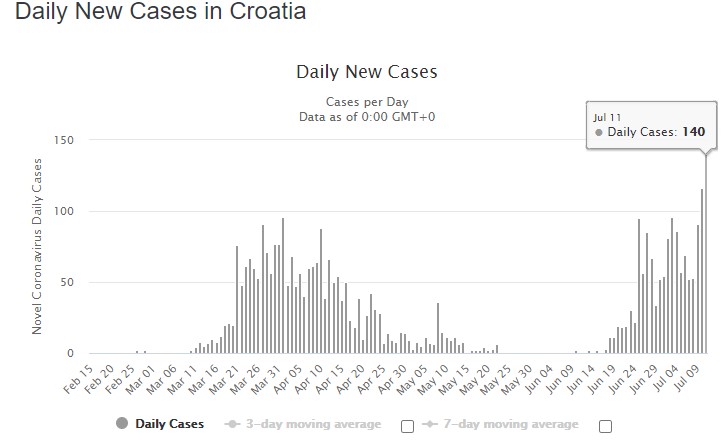 source:worldometer.org | 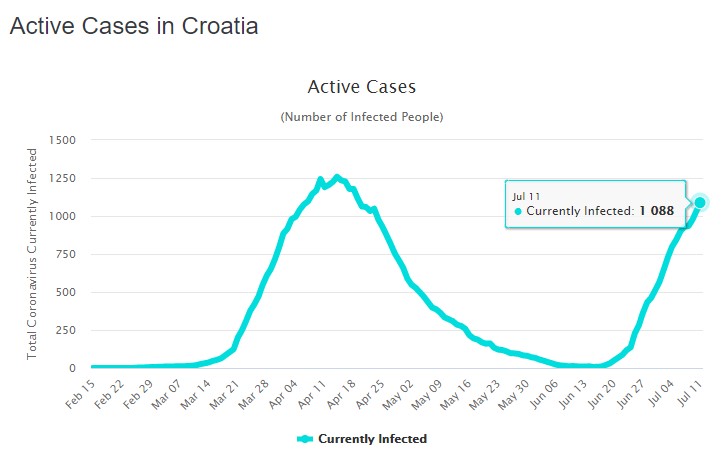 |
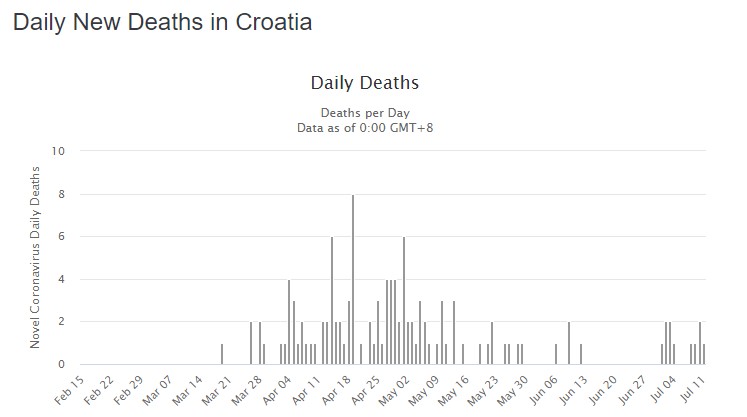 source:worldometer.org |
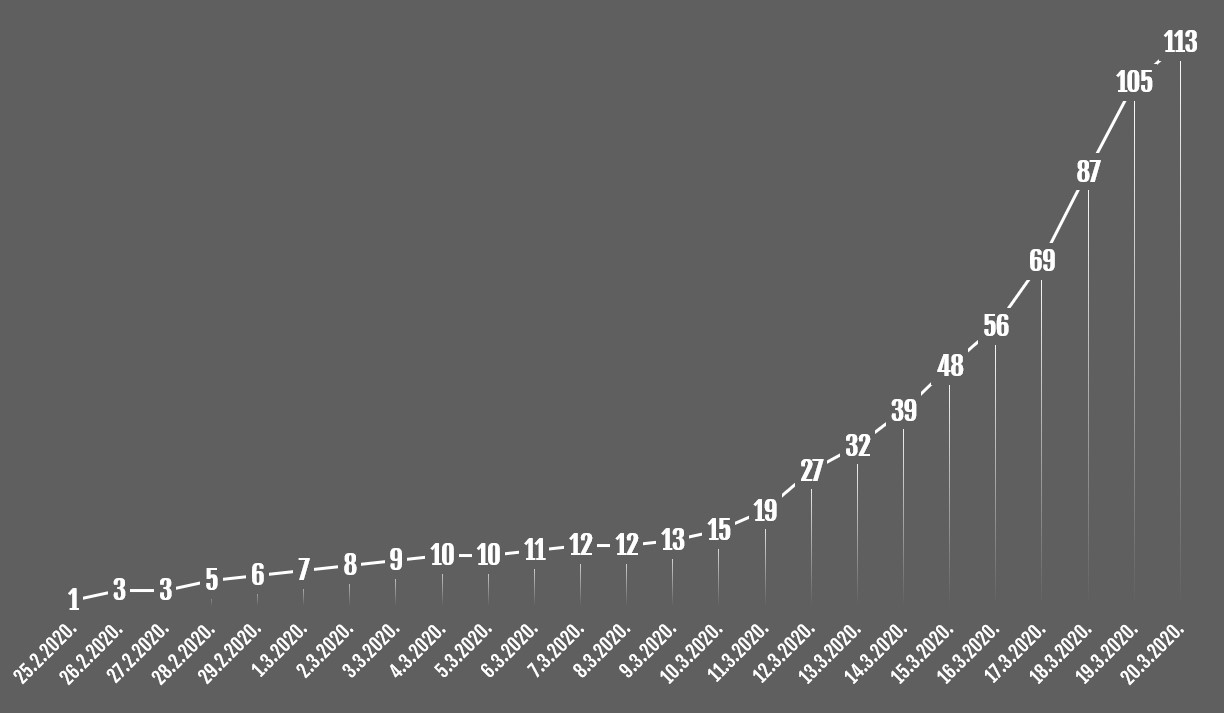
COVID19 cases till the closure of the borders (19th of March 2020) - source: telegram.hr
3.1 Testing policy
It was clear that the rise in the number of cases could cause public panic and unrest, and that is necessary to make a focal point of informing not only the citizens but the health workers too. A lot of misinformation appeared in the media, which caused people storming in stores and buying large quantities of essential food (flour, sugar, oil) even though the government repeatedly warned that there is no shortage in goods[23] .
Therefore, on February 25th, as the first case was confirmed, the central headquarter for the Corona epidemic decided to hold a daily press conference, informing the public about the day-to-day cases and potential new restriction and measures. Almost a month later, the government also launched an official webpage, koronavirus.hr, both in English and Croatian, which provided real-time information about the epidemic.
[24] .
Therefore, on February 25th, as the first case was confirmed, the central headquarter for the Corona epidemic decided to hold a daily press conference, informing the public about the day-to-day cases and potential new restriction and measures. Almost a month later, the government also launched an official webpage, koronavirus.hr, both in English and Croatian, which provided real-time information about the epidemic.
[24] .
From the beginning of the pandemic, Croatia had a narrow testing policy, opposite to South Korea, Taiwan, Israel, New Zealand and Spain. A person was able to be tested only if they came in contact with a confirmed case of COVID-19 or if they recently travelled from a heavily affected area. In a basic scenario, a person would need to develop one of the symptoms described by WHO, contact their family doctor who would then estimate if it is necessary for the person to be tested [25] . The testing policy made sense at the beginning of the pandemic when most of the cases were imported and easily tracked. Later, when the local transmission started, and the number of affected people rose, the testing policy was criticised, mainly by the opposition parties[26] . The experts argued that Croatia is taking the lowest number of tests in the region, even compared to non-EU countries such as Bosnia and Herzegovina or Serbia[27] .
3.2 Ask Andrija - COVID19 virtual assistant
The expansion of the epidemic in Croatia caused fear among the general population. Phone lines were blocked by multiple individuals enquires about the virus. That resulted in pressuring doctors who spent a significant amount of their time answering falsely assumed cases of COVID-19.
In order to respond to the public need and liberate essential medical resources, on the 14th of April the Croatian government launched the virtual assistant Andrija. The virtual assistant was named Andrija as a way to honour Andrija Štampar, founder of the Croatian Public Health Institute[28] . Andrija was easily reached on Whatsapp and in a few questions could answer if the individual should take additional measures and contact their doctor. The virtual assistant was well-received and largely praised by the media, the general public and experts[29] .
Even though the Croatian government planned to develop and launch a Corona virus tracking app as was the case in Norway, Netherlands, Germany and several other countries, the political opposition and a significant part of the public were against it. [30]
In order to respond to the public need and liberate essential medical resources, on the 14th of April the Croatian government launched the virtual assistant Andrija. The virtual assistant was named Andrija as a way to honour Andrija Štampar, founder of the Croatian Public Health Institute[28] . Andrija was easily reached on Whatsapp and in a few questions could answer if the individual should take additional measures and contact their doctor. The virtual assistant was well-received and largely praised by the media, the general public and experts[29] .
Even though the Croatian government planned to develop and launch a Corona virus tracking app as was the case in Norway, Netherlands, Germany and several other countries, the political opposition and a significant part of the public were against it. [30]
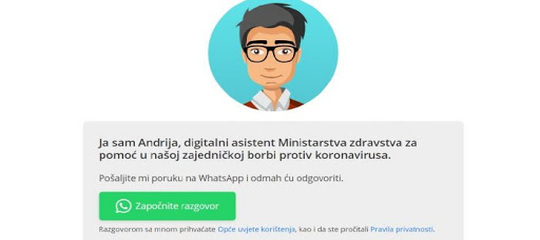
Andrija - Croatian Virtual Assistant, source: pressedan.hr
3.3 COVID19 STOP Application
DISCLAIMER: The tracking application is recently introduced (27th of July) and therefore it doesn't perfectly fit in the rest of the data shown in the Wiki article. Regardless, since it presents an important momentum in Croatian crisis management, I have decided to include it.
Similar to Chile,France, South Korea, Germany, and several other countries, Croatia decided to implement a digital solution for tracking infection cases and their contacts. On July 27th, the official "STOPCOVID19" app was presented by Croatian health minister Vili Beroš, director of Apis data company Saša Bilić and epidemiologist Tomislav Benjak. The application was created according to the recommendation of EU Commission 2020/518. The installation of the application is voluntary and all data is protected according to the highest data safety standards [31] . One thing in which Croatia differed in comparison to other country is the possibility of a mandatory usage of the app which was announced only a day after the release of the app by minister Vili Beroš[32]
Similar to Chile,France, South Korea, Germany, and several other countries, Croatia decided to implement a digital solution for tracking infection cases and their contacts. On July 27th, the official "STOPCOVID19" app was presented by Croatian health minister Vili Beroš, director of Apis data company Saša Bilić and epidemiologist Tomislav Benjak. The application was created according to the recommendation of EU Commission 2020/518. The installation of the application is voluntary and all data is protected according to the highest data safety standards [31] . One thing in which Croatia differed in comparison to other country is the possibility of a mandatory usage of the app which was announced only a day after the release of the app by minister Vili Beroš[32]
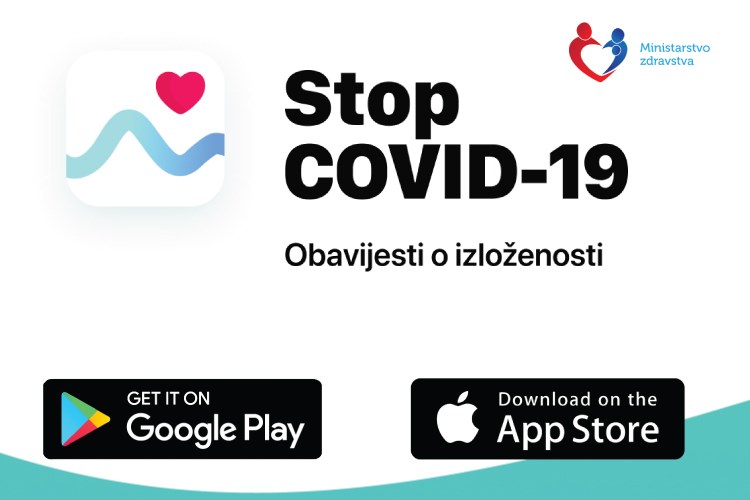
Source: koronavirus.hr
Poll created by 24sata.hr(most popular Croatian news portal)
"Will you install the new presented Covidapp on your phone'" (DA/YES-NE/NO)
"Will you install the new presented Covidapp on your phone'" (DA/YES-NE/NO)
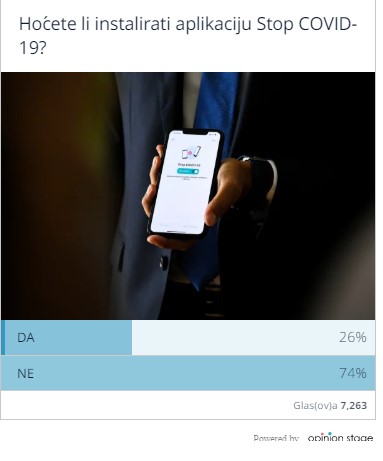
Source:24sata.hr
4 Decision-making
4.1 Establishing Civil Protection Headquarters of the Republic of Croatia and hierarchy
Establishing the clear and logical network of the command in which decisions can be implemented during the crisis, is one of the main tasks in decisionmaking (Boin et. al, 2016: 50)[33]
As mentioned above, on the 25th of February, the Croatian government created the Civil Protection Headquarters of the Republic of Croatia, making it the main and central coordinating body for responding to the epidemic. The Headquarters were comprised of the representative of the Ministry of Health and Ministry of Internal Affairs and several medical experts specialized in public health and epidemics.
[34] .
As mentioned above, on the 25th of February, the Croatian government created the Civil Protection Headquarters of the Republic of Croatia, making it the main and central coordinating body for responding to the epidemic. The Headquarters were comprised of the representative of the Ministry of Health and Ministry of Internal Affairs and several medical experts specialized in public health and epidemics.
[34] .
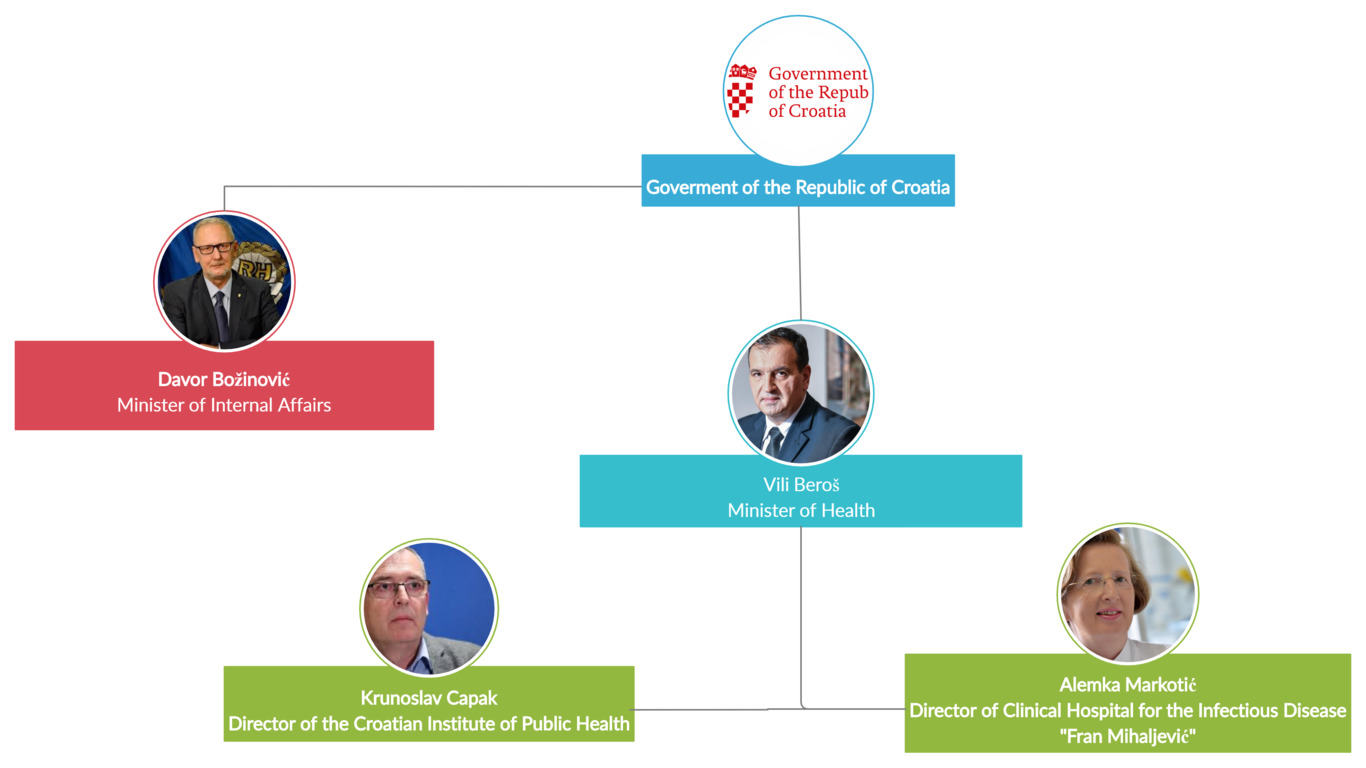
Sources: vecernji.hr, slobodnadalmacija.hr, gov.hr, hzjz.hr, bmf.hr
It has been proven that decentralisation of the command chain in the crisis management can improve decision making (Thomann et al., 2019)[35] For the same reason, Croatia decided to decentralize the system of making decisions. The same organisational structure that was used in establishing national civil protection headquarter was also used in establishing local civil protection headquarters. Each county (Croatian: županija) formed their own headquarters responsible for dealing with the epidemic on the field.
4.2 Timeline of making decisions
The progression of the situation and the emergence of new cases influenced the tempo and severity of implementing measures. The following timeline will show how the Civil Protection Headquarters implement measures, based on the current epidemiological situation.
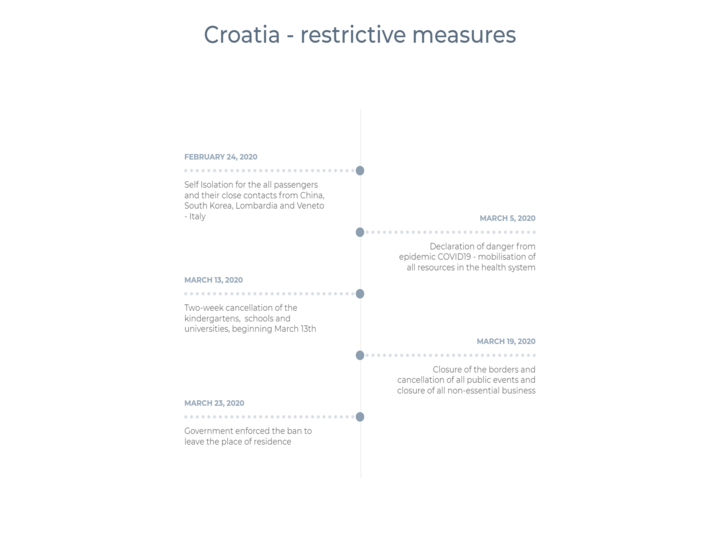
Source: Koronavirus.hr
Since the Croatian economy is highly depended on services and imports, it was heavily impacted during that period. The Croatian government in response decided to implement several measures and issue financial aid packages to support the economy.
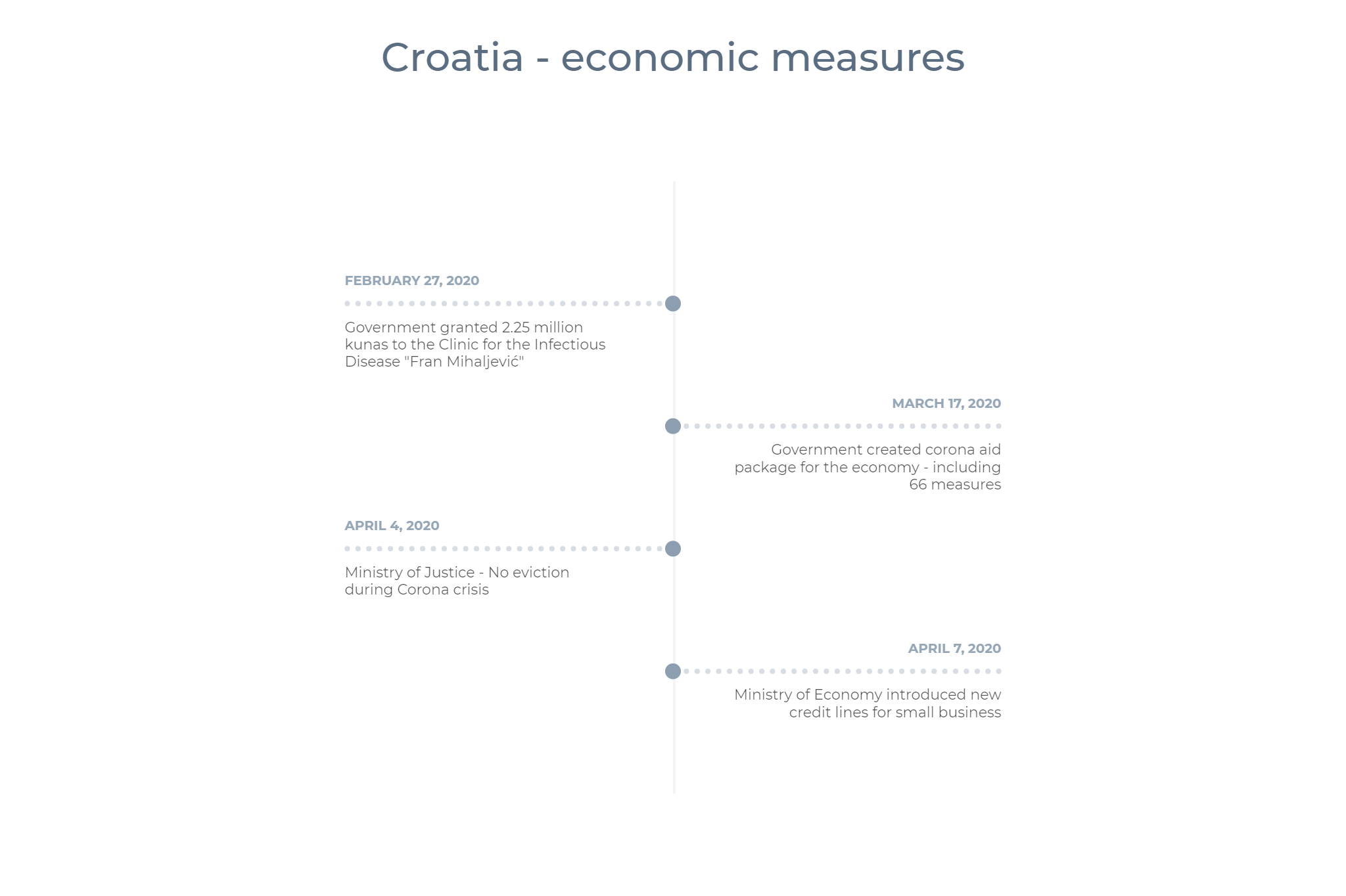
Source: koronavirus.hr
4.3 Croatia declared victory over the virus - radical relaxation of the measures
At the beginning of May, the overall situation with the pandemic was getting better in most of Europe. Regardless of the improvement, many countries including France, Italy, and Spain were still preserving most of the earlier enforced measures. That wasn't the case in Croatia where the government declared victory over the virus. Encouraged by good numbers and pressured by the tourism industry which suffered the most from the imposed measures, Croatia radically withdrew all the previously implemented measures. While the previously mentioned countries still imposed bans for border crossing, Croatia had fully opened its borders, including re-opening numerous night clubs and bars which still were considered high-risk places for a disease outbreak. [36] .
Additionally, Croatia was one of the few countries without obligatory mask usage in closed spaces, and the necessity of wearing a mask was continuously denied by the Headquarter members[37] .
Unfortunately, the idea of a fast return to normality was quickly denied at the beginning of July by an enormous rise of the cases in Croatia and its neighbouring countries, such as Serbia and Bosnia and Herzegovina[38] . While the reintroduction of the entry ban was easy to implement in case of Serbia and Bosnia as non- EU countries, the same was harder in case of Croatia, since Croatia is an EU member from 2013. Still, the pressure imposed by Slovenia resulted in the reintroduction of the restriction measures in Croatia, including the obligation to wear a mask in closed spaces[39] .
Additionally, Croatia was one of the few countries without obligatory mask usage in closed spaces, and the necessity of wearing a mask was continuously denied by the Headquarter members[37] .
Unfortunately, the idea of a fast return to normality was quickly denied at the beginning of July by an enormous rise of the cases in Croatia and its neighbouring countries, such as Serbia and Bosnia and Herzegovina[38] . While the reintroduction of the entry ban was easy to implement in case of Serbia and Bosnia as non- EU countries, the same was harder in case of Croatia, since Croatia is an EU member from 2013. Still, the pressure imposed by Slovenia resulted in the reintroduction of the restriction measures in Croatia, including the obligation to wear a mask in closed spaces[39] .
5 Legitimacy
Every crisis produces legitimacy challenges for democratic governments. There is a delicate line between the rise of the trust in government and its downfall as has been shown in Brazil or Chile. Therefore, governments should strive to use that "window of opportunity" to secure trust for future hard actions in battling crisis (Boin et al., 2016:86) [40]
5.1 Strict measures – Heroes of the nation
According to the Corona Virus Government Response Tracker established by the University of Oxford, Croatia had one of the strictest measures in the world, achieving maximum points in 17 measured areas. Even though measures heavily impacted cultural and social life in Croatia, the Headquarters and the Croatian government had almost unitary support in the population. This support can be mainly explained by two factors: 1. There is an empirically proven tendency that in time of crisis support for the government rises [41] The Croatian people have previous experience in the shutdown of civil life and economic activities during the Homeland War in the 1990s[42] .
Since the Headquarters comprised of only a number of individuals that were constantly exposed by the media in daily press conferences, their individual popularity increased significantly as well. Online and public spaces were filled with messages of support, particularly to the Health Minister Vili Beroš and the two main epidemiologists working with him, Alemka Markotić and Krunoslav Capak.
[43] .
Since the Headquarters comprised of only a number of individuals that were constantly exposed by the media in daily press conferences, their individual popularity increased significantly as well. Online and public spaces were filled with messages of support, particularly to the Health Minister Vili Beroš and the two main epidemiologists working with him, Alemka Markotić and Krunoslav Capak.
[43] .
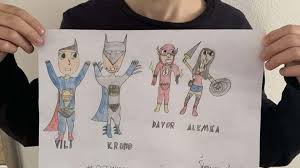
Drawing of the 9-year-old boy Šimun - depicting members of Headquarters as the superheroes, Source: dnevnik.hr
5.2 Politicisation of the crisis – downfall of legitimacy
Besides COVID-19, one of the events of primary social and political interest at the moment in Croatia are the parliamentary elections scheduled for the 5th of July. The high popularity of the Headquarters in which two ministers took place that limited the space for the political activity of the opposition, encouraged political exploitation of the situation. The date of the election was rushed despite the fact that another crisis in the form of a strong earthquake struck Zagreb, leaving the sanitation of the city to the next government [44] .
Forcing the partisanship of the members of the Headquarters, however, brought another set of problems. Experts of the topic were slowly depicted less as experts and more as a committee of the ruling party. Opposition heavily criticised the Headquarters for making the political decision and aggressively lifting the measures and opening the country. In fear of losing votes, other members of the Headquarters started giving contradictory statements, leading to a confusion of the public. For example, Alemka Markotić, one of the main epidemiologists in the Headquarters declared breaking self-isolation an act of bioterrorism, while her colleague, Krunoslav Capak, said that it's possible that people in obligatory quarantine will be able to go to the voting centres. Another cause of confusion was the inconsistent attitude about mask-wearing, which changed from time to time, without explanation [45] .
Forcing the partisanship of the members of the Headquarters, however, brought another set of problems. Experts of the topic were slowly depicted less as experts and more as a committee of the ruling party. Opposition heavily criticised the Headquarters for making the political decision and aggressively lifting the measures and opening the country. In fear of losing votes, other members of the Headquarters started giving contradictory statements, leading to a confusion of the public. For example, Alemka Markotić, one of the main epidemiologists in the Headquarters declared breaking self-isolation an act of bioterrorism, while her colleague, Krunoslav Capak, said that it's possible that people in obligatory quarantine will be able to go to the voting centres. Another cause of confusion was the inconsistent attitude about mask-wearing, which changed from time to time, without explanation [45] .
Number of tests - 28.6. 2020 | |||||
Croatia | BIH | Serbia | Slovenia | Hungary
| |
Total number | 75437 | 88548 | 380808 | 99688 | 271194
|
Per Capita | 18375 | 26989 | 43583 | 47951 | 28073 |
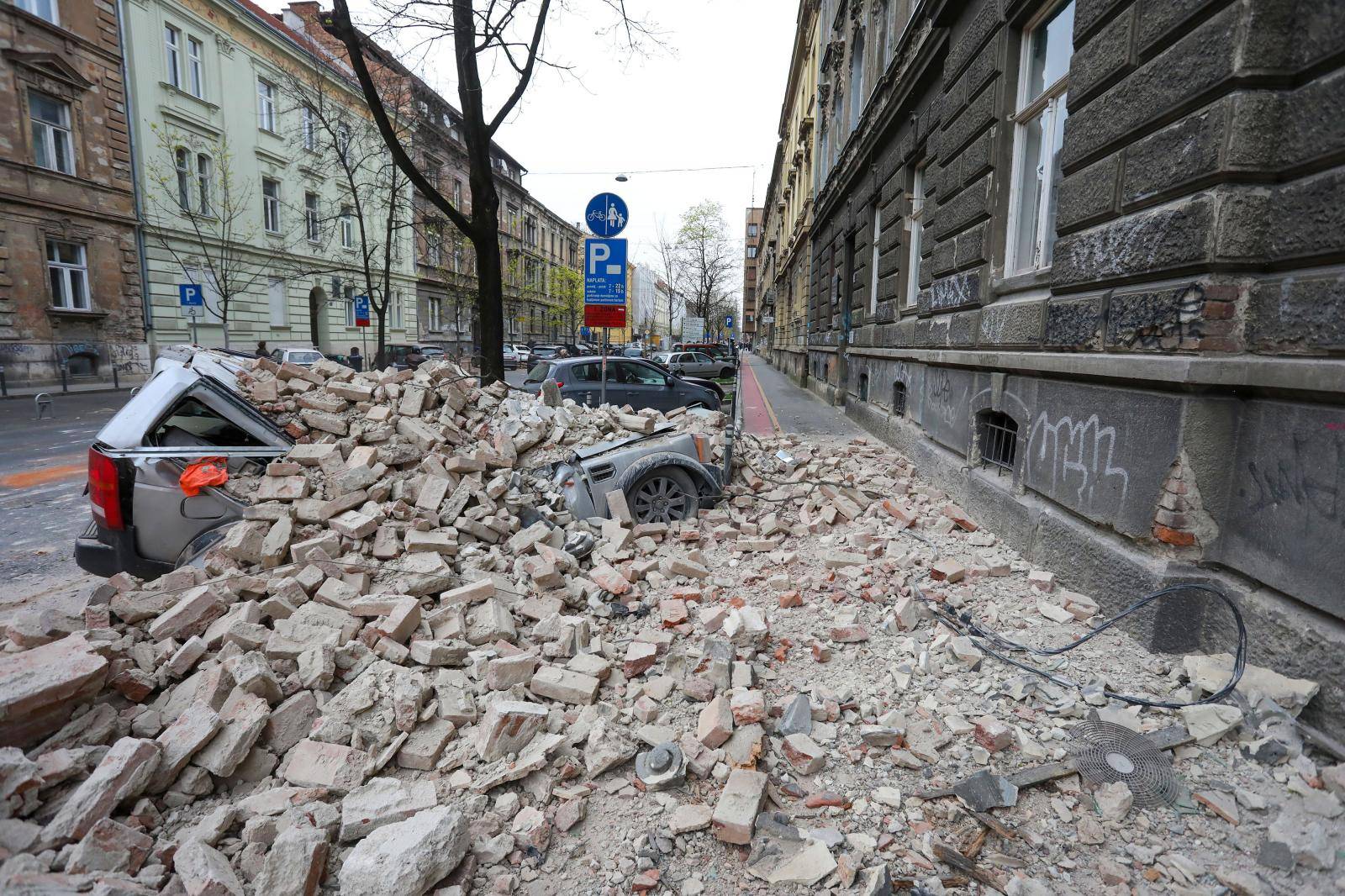
Devastation in Zagreb after the earthquake (22th of March)
Source: 24sata.hr
5.3 Zadar Tennis tournament – Prime Minister refused quarantine
The situation getting better at the end of April encouraged the government to open Croatia to visitors from the rest of Europe. High dependency on tourism forced the country to lift measures for the sake of saving the already lost touristic season. One of the events that were supposed to advertise Croatia as a safe holiday destination was the Adria Tour – a humanitarian tennis tournament which gathers the most famous tennis players in the Croatian coastal city of Zadar. The event was massively attended with over 5000 spectators and it was also advertised and supported by the Croatian government. While some countries had just opened their borders, Croatia held full-scale events[46] .
Unfortunately, instead of the planned advertisement of Croatian tourism, the public was shocked by the news that one of the players was tested positive for COVID-19[47] . To make the situation worse, because of the humanitarian cause of the tournament, the infected player was in close contact with a lot of people, including a group of children. The tournament was cancelled, and the Headquarters sent an epidemiologist in Zadar for extensive testing of all of the participants.
Several close contacts were tested positive, including the organisers of the tournament, Goran Ivanišević and Novak Đoković. Since the tournament was sponsored by the Croatian government, the Prime Minister, Andrej Plenković, was too in close contact with both infected organisers. Even though by all epidemiological standards Plenković was obligated to remain in quarantine, he refused to do that after he was tested negative[48] . The focus of the public switched to the Headquarters and its experts who could publicly advise the Prime Minister to uphold the quarantine standards. However, because members of the Headquarters were no longer only experts but prospective members for the Parliament, they didn't react. Instead of applying the rules that they imposed at the beginning of the pandemic, they defended Plenković, "bending" the standard for close contact that required a mandatory 14-day quarantine[49] .
This outraged the public whose citizens felt that the same rules did not apply for everyone. In the same time, there were more and more arguments that Croatia is not testing enough and that it was trying to hide the real situation to save the touristic season and maintain the approval ratings of the government[50] .
Unfortunately, instead of the planned advertisement of Croatian tourism, the public was shocked by the news that one of the players was tested positive for COVID-19[47] . To make the situation worse, because of the humanitarian cause of the tournament, the infected player was in close contact with a lot of people, including a group of children. The tournament was cancelled, and the Headquarters sent an epidemiologist in Zadar for extensive testing of all of the participants.
Several close contacts were tested positive, including the organisers of the tournament, Goran Ivanišević and Novak Đoković. Since the tournament was sponsored by the Croatian government, the Prime Minister, Andrej Plenković, was too in close contact with both infected organisers. Even though by all epidemiological standards Plenković was obligated to remain in quarantine, he refused to do that after he was tested negative[48] . The focus of the public switched to the Headquarters and its experts who could publicly advise the Prime Minister to uphold the quarantine standards. However, because members of the Headquarters were no longer only experts but prospective members for the Parliament, they didn't react. Instead of applying the rules that they imposed at the beginning of the pandemic, they defended Plenković, "bending" the standard for close contact that required a mandatory 14-day quarantine[49] .
This outraged the public whose citizens felt that the same rules did not apply for everyone. In the same time, there were more and more arguments that Croatia is not testing enough and that it was trying to hide the real situation to save the touristic season and maintain the approval ratings of the government[50] .
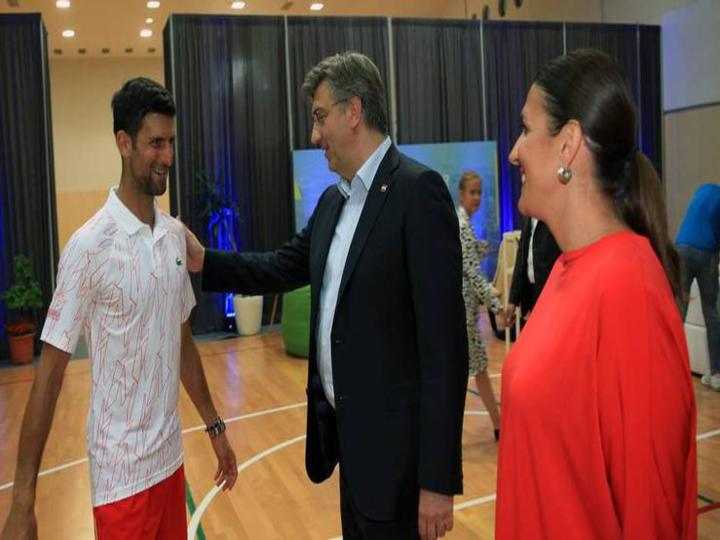
Croatian Prime Minister touching later positively tested tennis player Novak Đoković , source: express.24sata.hr
6 Overall evaluation
6.1 Preparedness evaluation
Even though the Croatian health system had a limited capacity, most of the dedicated resources for treating COVID19 patients weren't used. That led to dismantling most of the tents in front of the hospitals, including removing the beds from the temporary hospital for mild cases "Arena Zagreb"[51] . The new rise of the cases after loosening the measures highlighted the necessity of maintaining alertness of the health system, however, the Croatian health system is still successfully maintaining its operationality.
6.2 Sense-making evaluation
Sense-making, more precisely testing policy, remained the most controversial part of the Croatian crisis management. Despite the warning from experts and the political opposition[52] , Croatia continued to conduct small amount of the COVID19 tests on a daily basis. Croatian Civil Headquarters, including epidemiologists, claimed that the testing policy, despite the small numbers, is precise and thoroughly planned[53] . This interpretation was not accepted by several European countries which have put Croatia on the "warning list", meaning that every visitor from Croatia is obligated to stay in a 14-day quarantine[54] .
6.3 Decision-making evaluation
At the beggining of the pandemic, Croatia was internationally praised for its fast and determined response to it[55] . Good results and a low number of fatalities[56] encouraged the Croatian prime minister, Andrej Plenković, to declare victory over the pandemic[57] . That enthusiasm led to the rapid removal of all the restrictions as well as the opening of borders, which was criticised by one of the most famous Croatian scientists, Ivan Đikić[58]
Unfortunately, Đikić's predictions were correct and only a month and a half after declaring victory over the virus, Croatia measured the highest number of infected people from the beginning of the pandemic[59] . In order to prevent further spread of the virus and protect the status of Croation as a safe country, the Civil Headquarters issued a decision for obligatory mask usage in closed spaces[60] .
Unfortunately, Đikić's predictions were correct and only a month and a half after declaring victory over the virus, Croatia measured the highest number of infected people from the beginning of the pandemic[59] . In order to prevent further spread of the virus and protect the status of Croation as a safe country, the Civil Headquarters issued a decision for obligatory mask usage in closed spaces[60] .
6.4 Legitimacy evaluation
The rise of new cases and the controversial decision of the national headquarters[61] lead to a decline in people's trust in the government. All pre-election polls have predicted the defeat of the ruling party on July's elections. However, it seems that all the controversy didn't manage to discredit the ruling party which achieved one of the best results in modern Croatian history[62] . Furthermore, the Croatian Health minister Vili Beroš won the most preferential votes which underlines the fact that voters didn't punish the mistakes of the headquarters[63] .
However, numerous challenges are awaiting the Croatian government, among them an incoming second wave of the pandemic and economic issues that seem inevitable since the low number of visitors this season will create a deficit in the Croatian budget[64] .
However, numerous challenges are awaiting the Croatian government, among them an incoming second wave of the pandemic and economic issues that seem inevitable since the low number of visitors this season will create a deficit in the Croatian budget[64] .
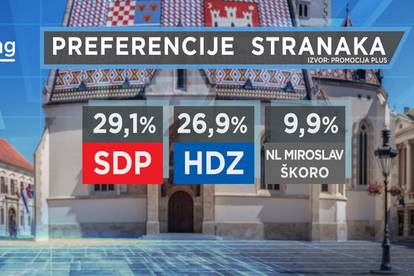
source:24sata.hr
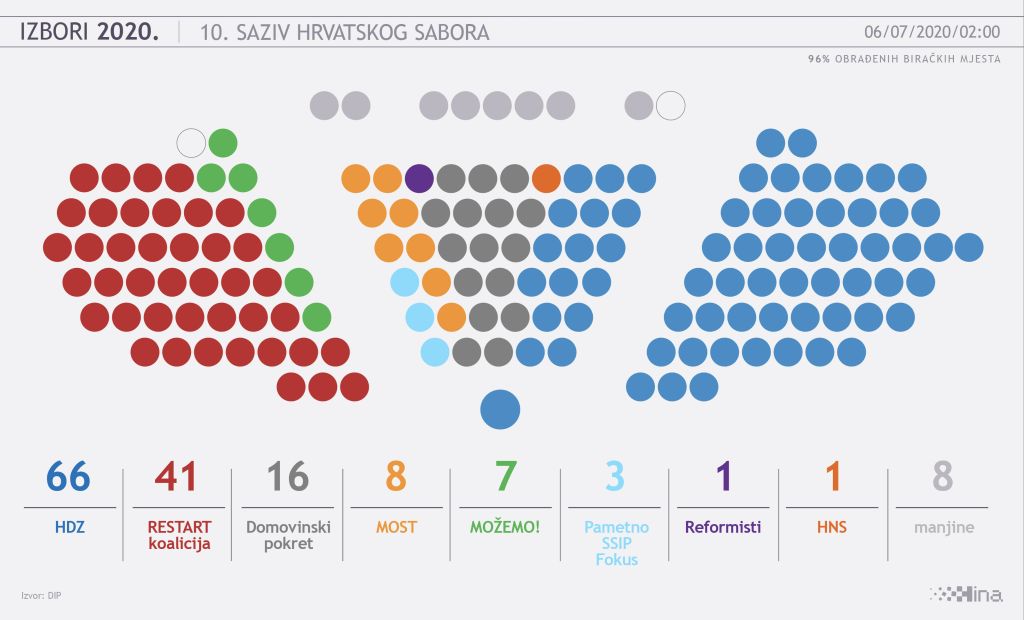
Source: narod.hr
6.5 Personal opinion
In a positive manner, the Croatian experience during the COVID-19 crisis showed that only a few countries could efficiently battle the epidemic. It also showed that previous experience with a state of emergency helped the implementation of strict measures. Additionally, Croatia timely activated measures which resulted in a both low infection rate and death rate for the period before the lifting of the measures. The government’s financial package saved numerous small businesses, providing pay checks for the workers for three months’ time.
On the other hand, the prolonging of the crisis and a temporary success caused lower long term efficiency. People started showing the ‘’paradox of success“ and stopped following the measures, while the government rushed to take advantage of the political capital created during the first phase of the pandemic. While it is clear that vaccines will not be available anytime soon, lower legitimacy of central authority and relaxation of measures could cause a big problem in dealing with a potential second wave of a crisis. It has been shown that even though the popularity of the government rises during a state of emergency, aggressive politicisation of the situation can result in backslash, lost of trust in the government and even a difficulty to implement further necessary measures.
On the other hand, the prolonging of the crisis and a temporary success caused lower long term efficiency. People started showing the ‘’paradox of success“ and stopped following the measures, while the government rushed to take advantage of the political capital created during the first phase of the pandemic. While it is clear that vaccines will not be available anytime soon, lower legitimacy of central authority and relaxation of measures could cause a big problem in dealing with a potential second wave of a crisis. It has been shown that even though the popularity of the government rises during a state of emergency, aggressive politicisation of the situation can result in backslash, lost of trust in the government and even a difficulty to implement further necessary measures.
7 Country's favourite stay at home song
For the favourite "stay at home" song people of Croatia have chosen the song "Moja Domovina", originally created during the Homeland war for rising the moral during the wartime.
People singing Moja Domovina at their balconies
Source: 24sata.hr
[1] WHO.org (2020) Novel coronavirus. https://www.who.int/csr/don/12-january-2020-novel-coronavirus-china/en Access date: 30.06.2020
[2] WHO.org (2020) Statement of the second meeting of the international health regulations https://www.who.int/news-room/detail/30-01-2020-statement-on-the-second-meeting-of-the-international-health-regulations-(2005)-emergency-committee-regarding-the-outbreak-of-novel-coronavirus-(2019-ncov) Access date: 30.06.2020
[3] Reuters.com (2020) Coronavirus outbreak grows in northern Italy 16 cases reported in one day. https://www.reuters.com/article/us-china-health-italy/coronavirus-outbreak-grows-in-northern-italy-16-cases-reported-in-one-day-idUSKBN20F0UI Access date: 30.06.2020
[4] Bbc.com (2020) Coronavirus: Italy extends emergency measures nationwide. https://www.bbc.com/news/world-europe-51810673 Access date: 30.06.2020
[5] Nytimes.com (2020) Europe, with eye on Italy Coronavirus quarantine, plans next moves. https://www.nytimes.com/2020/03/08/world/europe/coronavirus-europe.html Access date: 30.06.2020
[6] Bsg.ox.ac.uk (2020) Coronavirus government response tracker. https://www.bsg.ox.ac.uk/research/research-projects/coronavirus-government-response-tracker Access date: 30.06.2020
[7] Boin, A., ‘t Hart, P., Stern, E., & Sundelius, B. (2016). Managing Crises: Five Strategic Leadership Tasks. In The Politics of Crisis Management: Public Leadership under Pressure (pp. 3-22). Cambridge: Cambridge University Press
[8] Boin, A., ‘t Hart, P., Stern, E., & Sundelius, B. (2016). Managing Crises: Five Strategic Leadership Tasks. In The Politics of Crisis Management: Public Leadership under Pressure (pp. 3-22). Cambridge: Cambridge University Press.
[9] Boin, A., ‘t Hart, P., Stern, E., & Sundelius, B. (2016). Managing Crises: Five Strategic Leadership Tasks. In The Politics of Crisis Management: Public Leadership under Pressure (pp. 3-22). Cambridge: Cambridge University Press
[10] Koronavirus.hr (2020) Vladine mjere. https://koronavirus.hr/vladine-mjere/101 Access date: 30.06.2020
[11] Stampar.hr (2020) Dr. Andrija Štampar - Život i djelo. http://www.stampar.hr/hr/dr-andrija-stampar-zivot-i-djelo Access date: 30.06.2020
[12] Vlada.gov.hr (2020) Coronavirus protection measures. https://vlada.gov.hr/coronavirus-protection-measures/28950 Access date: 30.06.2020
[13] Novilist.hr (2020) Kako se Hrvatska priprema za korona virus. https://www.novilist.hr/vijesti/hrvatska/kako-se-hrvatska-priprema-za-koronavirus-karantena-za-sve-koji-su-bili-u-blizini-oboljelih-u-italiji Access date: 30.06.2020
[14] Vlada.gov.hr (2020) Coronavirus protection measures. https://vlada.gov.hr/coronavirus-protection-measures/28950 Access date: 30.06.2020
[15] Zdravlje.gov.hr (2020) Beroš: Nabava dodatnih zaštitnih maski, imamo dosta testova, u tijeku pripreme smještajnih kapaciteta za oboljele. https://zdravlje.gov.hr/vijesti/beros-nabava-dodatnih-zastitnih-maski-imamo-dosta-testova-u-tijeku-pripreme-smjestajnih-kapaciteta-za-oboljele/5097 Access date: 30.06.2020
[16] Večernji.hr (2020) Postavljaju se bolnički kreveti: Arena Zagreb postaje bolnica za lakše oboljele. https://www.vecernji.hr/vijesti/postavljaju-se-bolnicki-kreveti-arena-zagreb-postaje-bolnica-za-lakse-oboljele-1387404 Access date: 30.06.2020
[17] Jutarnji.hr (2020) Vlada donijela odluku o ograničenju cijena. https://www.jutarnji.hr/vijesti/hrvatska/vlada-donijela-odluku-o-ogranicavanju-cijena-kontrole-se-primjenjuju-na-niz-medicinskih-i-prehrambenih-proizvoda-na-listi-brasno-mlijeko-jaja-10092865 Access date: 30.06.2020
[18] Vijesti.hrt.hr (2020) Poljska bolnica ispred KB Dubrava. https://vijesti.hrt.hr/592915/poljska-bolnica-ispred-kb-dubrava Access date: 14.7.2020
[19] Večernji.hr (2020) Postavljaju se bolnički kreveti: Arena postage bolnica za lakše oboljele. https://www.vecernji.hr/vijesti/postavljaju-se-bolnicki-kreveti-arena-zagreb-postaje-bolnica-za-lakse-oboljele-1387404 Access date: 14.7.2020
[20] Ghsindex.org (2020) About. https://www.ghsindex.org/about Access date: 12.07.2020
[21] Telegram.hr (2020) Kronologija korone u Hrvatskoj. https://www.telegram.hr/zivot/kronologija-korone-u-hrvatskoj-ovako-je-u-25-dana-rastao-broj-zarazenih Access date: 30.06.2020
[22] Novilist.hr (2020) Zabranjen prelazak granice, hrvatski radnici ipak neće moći na posao u Sloveniju. https://www.novilist.hr/vijesti/hrvatska/zabranjen-prelazak-granice-hrvatski-radnici-ipak-nece-moci-na-posao-u-sloveniju Access date: 30.06.2020
[23] Vlada.gov.hr (2020) Marić: Nema potrebe za stvaranjem pretjeranih zaliha. https://vlada.gov.hr/vijesti/maric-nema-potrebe-za-stvaranjem-pretjeranih-zaliha/29003 Access date: 30.06.2020
[24] Vlada.gov.hr (2020) Corona protection measures. https://vlada.gov.hr/coronavirus-protection-measures/28950 Access date: 30.06.2020
[25] Hzjz.hr (2020) Korona: Najnoviji podaci. https://www.hzjz.hr/priopcenja-mediji/koronavirus-najnoviji-podatci/2 Access date: 30.06.2020
[26] Jutarnji.hr (2020) Sdpovi liječnici pozivaju na hitno testiranje medicinskog osoblja. https://www.jutarnji.hr/vijesti/hrvatska/sdp-ovi-lijecnici-pozivaju-na-hitno-testiranje-medicinskog-osoblja-napravimo-korona-free-zone-u-bolnicama-gdje-cemo-moci-kvalitetno-lijeciti-ljude-10137967 Access date: 30.06.2020
[27] Index.hr (2020) Lječnička komora: Premalo testiramo, to se mora povećati. https://www.index.hr/vijesti/clanak/lijecnicka-komora-premalo-testiramo-na-koronavirus-to-se-mora-povecati/2168695.aspx Access date: 30.06.2020
[28] Vlada.gov.hr (2020) Predstavljen Andrija, prvi digitalni asistent u borbi protiv korona virusa. https://vlada.gov.hr/vijesti/predstavljen-andrija-prvi-digitalni-asistent-u-borbi-protiv-koronavirusa/29226
[29] Tportal.hr (2020) Digitalni Andrija pomaže zaposlenicima i korisnicima domova za starije. https://www.tportal.hr/vijesti/clanak/digitalni-andrija-pomaze-zaposlenicima-i-korisnicima-domova-za-starije-20200429 Access date: 30.06.2020
[30] Novilist.hr (2020) Praćenje građana radi utvđivanja krše li samoizolaciju je kršenje prava i uvod u diktaturu. https://www.novilist.hr/vijesti/hrvatska/oporba-pracenje-gradana-radi-utvrdivanja-krse-li-samoizolaciju-je-krsenje-prava-i-uvod-u-diktaturu Access date: 13.07.2020
[31] Zdravlje.gov.hr (2020) Predstavljena mobilna aplikacija STOPCOVID19. https://zdravlje.gov.hr/vijesti/predstavljena-mobilna-aplikacija-stop-covid-19/5259
[32] Jutarnji.hr (2020) Aplikacija uskoro ipak obvezna. https://www.jutarnji.hr/vijesti/hrvatska/aplikacija-ipak-uskoro-obvezna-beros-ne-samo-to-ako-se-pogorsa-bit-ce-i-niz-drugih-mjera-15010555
[33] Boin, A., ‘t Hart, P., Stern, E., & Sundelius, B. (2016). Decision Making and Coordinating: Shaping the Crisis Response. In The Politics of Crisis Management: Public Leadership under Pressure (pp. 49-77). Cambridge: Cambridge University Press. doi:10.1017/9781316339756.004
[34] Vlada.gov.hr (2020) Coronavirus protection measures. https://vlada.gov.hr/coronavirus-protection-measures/28950 Access date: 30.06.2020
[35] Thomann, Eva, Philipp Trein, and Martino Maggetti (2020) What's the problem? Multilevel governance and problem‐solving. European Policy Analysis 5(1): 37-57
[36] Večernji.hr (2020) Noćni klubovi se otvaraju no bez plesnih podija. https://www.vecernji.hr/vijesti/nocni-klubovi-se-otvaraju-no-bez-plesnih-podija-hzjz-donio-nove-preporuke-1406023
[37] Index.hr (2020) Stožer ne preporučuje nošenje maski zdravima, zašto u pošte ne puštaju zdrave?. https://www.index.hr/vijesti/clanak/stozer-ne-preporucuje-nosenje-maski-zdravima-zasto-u-poste-ne-pustaju-bez-maski/2168434.aspx Access date: 28.7.2020
[38] N1.info (2020) Zbog porasta broja slučajeva raste zabrinutost na Balkanu. http://hr.n1info.com/Vijesti/a526597/Zbog-porasta-broja-slucajeva-koronavirusa-raste-zabrinutost-na-Balkanu.html
[39] Večernji.hr (2020) Slovenija: Odmah zatvorite noćne klubove. https://www.vecernji.hr/vijesti/slovenija-hrvatskoj-odmah-zatvorite-nocne-klubove-1413378 Access date: 28.7.2020
[40] Boin, A., ‘t Hart, P., Stern, E., & Sundelius, B. (2016). Meaning Making: Constructing a Crisis Narrative. In The Politics of Crisis Management: Public Leadership under Pressure (pp. 78-101). Cambridge: Cambridge University Press.
[41] Euronews.com (2020) Why are politicians so popular during covid19 crisis? https://www.euronews.com/2020/04/16/analysis-why-are-our-politicians-so-popular-during-covid-19-crisis Access date: 30.06.2020
[42] Wikipedija.org (2020) Croatian war of Independence. https://en.wikipedia.org/wiki/Croatian_War_of_Independence Access date: 30.06.2020
[43] Dnevnik.hr (2020) Oni su njegovi heroji, pogledajte kako osmogodišnji Šimun iz Nuštra vidi članove nacionalnog stožera. https://dnevnik.hr/vijesti/koronavirus/oni-su-njegovi-heroji-pogledajte-kako-osmogodisnji-simun-iz-nustra-vidi-clanove-nacionalnog-stozera---599086.html Access date: 30.06.2020
[44] Index.hr (2020) Zagrebačka oporba prosvjeduje zbog zakona o potresu, biti će ispred Sabora do jutra.https://www.index.hr/vijesti/clanak/zagrebacka-oporba-prosvjeduje-zbog-zakona-o-potresu-bit-ce-pred-saborom-do-jutra/2183656.aspx Access date: 30.06.2020
[45] Jutarnji.hr (2020) Izdvojili smo sva pitanja oko kojih je vrludao Stožer. https://www.jutarnji.hr/vijesti/hrvatska/izdvojili-smo-sva-pitanja-oko-kojih-je-vrludao-stozer-maske-samoizolacija-bliski-kontakt-15004648 Access date: 30.06.2020
[46] Zadarskilist.hr (2020) Adria tour: Zadrani ponovno dočekali zvijezde, ali Đoković je ipak broj 1. https://www.zadarskilist.hr/clanci/20062020/adria-tour-zadrani-ponovno-docekali-teniske-zvijezde-ali-dokovic-je-ipak-broj-1 Access date: 30.06.2020
[47] Eurosport.com (2020) Adria tour cancelled after Grigor Dimitrov tests positive for coronavirus. https://www.eurosport.com/tennis/adria-tour/2020/adria-tour-final-cancelled-after-grigor-dimitrov-tests-positive-for-coronavirus_sto7782916/story.shtml Access date: 30.06.2020
[48] Reuters.com (2020) Croatian prime minister refuses to self-isolate after a brief encounter with Djokovic. https://www.reuters.com/article/us-health-coronavirus-tennis-croatia/croatian-pm-refuses-to-self-isolate-after-brief-encounter-with-djokovic-idUSKBN23U308 Access date: 30.06.2020
[49] Hzjz.hr (2020) Priopćenje vezano uz boravak premijera Andreja Plenkovića na teniskom turniru u Zadru. https://www.hzjz.hr/priopcenja-mediji/priopcenje-hzjz-a-vezano-uz-boravak-premijera-andreja-plenkovica-na-teniskom-turniru-u-zadru Access date: 30.06.2020
[50] Express.24sata.hr (2020) Dodir ramena koji je premijera uvalio u zamku častohleplja. https://express.24sata.hr/top-news/dodir-ramena-koji-je-premijera-uvalio-u-zamku-castohleplja-24389 Access date: 30.06.2020
[51] Večernji.hr (2020) Krenulo uklanjanje kreveta, Arena više nije karantena za oboljele. https://www.vecernji.hr/vijesti/krenulo-je-uklanjanje-kreveta-arena-vise-nije-karantena-za-oboljele-1399446
[52] Net.hr (2020) Testira li Hrvatska premalo? https://net.hr/danas/hrvatska/testira-li-hrvatska-premalo-testirani-su-svi-koji-moraju-biti-testirani-ako-imamo-20-slucajeva-ne-moramo-imati-2000-testiranja Access date: 14.7.2020
[53] 24sata.hr (2020) Dovoljno testiramo. Ne moramo na 20 slučajeva imati 2000 testiranja. https://www.24sata.hr/news/dovoljno-testiramo-ne-moramo-na-20-slucajeva-imati-2000-testiranje-701026 Acess date: 14.7.2020
[54] Dnevnik.hr (2020) Nizozemska stavila Hrvatsku na narančastu listu., turisti napuštaju Hrvatsku. https://dnevnik.hr/vijesti/koronavirus/nizozemska-stavila-hrvatsku-na-narancastu-listu-turisti-napustaju-hrvatsku-capak-mi-njima-ne-saljemo-podatke-ako-ih-ne-zatraze---614215.html Acess date: 24.7.2020
[55] Nytimes.com (2020) Europe’s battle-hardened nations show resilience in virus fight. https://www.nytimes.com/2020/05/10/world/europe/coronavirus-europe-resilience.html Acess date: 24.7.2020
[56] Večernji.hr (2020) Zasad najveća smrtnost u Europi, najmanja u Aziji. https://www.vecernji.hr/vijesti/zasad-najveca-smrtnost-u-europi-a-najmanja-u-aziji-1394461 Access date: 14.7.2020
[57] Index.hr (2020) Plenković: Ova vlada je pobjedila koronavirushttps://www.index.hr/vijesti/clanak/plenkovic-ova-vlada-je-pobijedila-koronavirus/2185893.aspx Access date: 14.7.2020
[58] Dnevnik.hr (2020) Đikić kritizirao odluke nacionalnog stožera i objasnio zašto su sada simptomi blaži: "Stožer se nije dovoljno fokusirao na opasnosti oko nas" https://dnevnik.hr/vijesti/koronavirus/ivan-djikic-o-stanju-s-epidemijom-koronavirusa-u-hrvatskoj---611240.html Access date: 14.7.2020
[59] Tportal.hr (2020) Subota je sa 140 zaraženih bila najteži dan od početka pandemije. https://www.tportal.hr/vijesti/clanak/uzivo-subota-je-sa-140-zarazenih-bila-najtezi-dan-od-pocetka-epidemije-a-epidemiolozi-najavljuju-i-gore-brojke-20200712 Access date: 24.7.2020
[60] Slobodnadalmacija.hr (2020) Od ponedjeljka će maske biti obavezne, nećete moći ni u trgovine bez njih! Dobre su i one platnene. Evo što kažu naši vodeći znanstvenici i liječnici. https://slobodnadalmacija.hr/vijesti/hrvatska/od-ponedjeljka-ce-maske-biti-obavezne-necete-moci-ni-u-trgovine-bez-njih-dobre-su-i-one-platnene-evo-sto-kazu-nasi-vodeci-znanstvenici-i-lijecnici-1031695 Access date: 14.7.2020
[61] Telegram.hr (2020) Capak danas: ‘Ni ako je Đoković pozitivan, premijer ne mora u izolaciju. Nisu imali bliski kontakt’. https://www.telegram.hr/politika-kriminal/capak-danas-ni-ako-je-dokovic-pozitivan-premijer-ne-mora-u-izolaciju-nisu-imali-bliski-kontakt Acess date: 14.7.2020
[62] Index.hr (2020) HDZ je nadmoćni pobjednik izbora. https://www.index.hr/vijesti/clanak/hdz-je-nadmocni-pobjednik-izbora/2195792.aspx Access date: 14.7.2020
[63] N1info.com (2020) Vili Beroš osvojio više od 34 tisuće preferencijalnih glasova. http://hr.n1info.com/Vijesti/a524009/Vili-Beros-osvojio-vise-od-34-tisuce-preferencijalnih-glasova.html Access date: 14.7.2020
[64] 24sata.hr (2020) U jesen dolazi kriza koja će biti puno gora nego ona 2009.https://www.24sata.hr/news/u-jesen-dolazi-kriza-koja-ce-biti-puna-gora-nego-ona-2009-696314 Access date: 14.7.2020